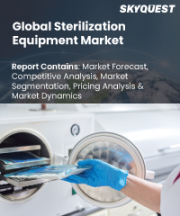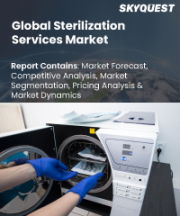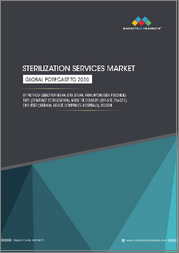
|
시장보고서
상품코드
1820409
멸균 장비 시장 규모, 점유율, 동향, 예측 : 제품별, 최종사용자별, 지역별(2025-2033년)Sterilization Equipment Market Size, Share, Trends and Forecast by Product, End User, and Region, 2025-2033 |
||||||
2024년 세계 멸균 장비 시장 규모는 163억 달러에 달했습니다. IMARC Group에 따르면, 이 시장은 2033년까지 314억 달러에 달하고, 2025-2033년 8.58%의 연평균 복합 성장률(CAGR)을 보일 것으로 예측됩니다. 현재 시장을 독점하고 있는 곳은 북미이며, 2024년에는 36.7% 이상의 시장 점유율을 차지할 것으로 예측됩니다. 이 지역 시장은 병원 내 감염 및 수술 증가, 엄격한 의료 정책, 감염 관리에 대한 인식, 멸균 장비의 발전과 업그레이드로 인해 확대되고 있습니다.
의료시설과 식품, 제약, 바이오테크놀러지 관련 산업에서 감염 관리에 대한 인식이 높아지면서 멸균 장비에 대한 수요가 증가할 것으로 예측됩니다. 현재 의료 서비스 제공업체는 환자의 안전을 보장하고 엄격한 규제에 대응하기 위해 멸균 기술 향상에 주력하고 있습니다. 첨단 기술은 저온 멸균 장비, 자동화 시스템 등 살균 장비의 효율성과 사용 편의성을 향상시키고 있습니다. 이러한 혁신은 헬스케어 및 산업용 사용자의 진화하는 요구에 부응하고 더 높은 신뢰성과 처리량을 보장합니다. 제약 및 의료기기 분야의 확대도 중요한 역할을 하고 있는데, 이들 산업은 포장 전 무균 환경에서 제품을 안정적으로 생산해야 하기 때문입니다. 일회용 의료기기에 대한 지속적인 관심은 안전성을 유지하기 위한 효과적인 멸균의 필요성을 보여줍니다. 전 세계적인 보건 비상사태로 인해 병원체 감염을 억제하기 위한 강력한 멸균 솔루션의 필요성이 증폭되어 시장 성장에 더욱 박차를 가하고 있습니다. 이러한 요인들이 복합적으로 작용하여 다양한 용도의 멸균장치에 대한 안정적인 수요가 확보되고 있습니다.
미국은 멸균 장비의 주요 지역 시장으로 부상하고 있습니다. 미국에서는 병원 내 감염이 증가하고 있으며, 감염 대책에 대한 관심이 높아지면서 멸균기 수요를 견인하고 있습니다. 새로운 요구 사항을 충족해야 할 필요성으로 인해 의료시설의 좋든 나쁘든 병원에 고도의 멸균 기술이 도입되고 있습니다. 시장을 더욱 활성화시키고 있는 것은 제약산업과 의료기기 산업의 성장입니다. 이러한 산업에서 제조업체는 제조 및 포장 과정에서 멸균 절차를 엄격하게 준수해야 합니다. 저온 살균 시스템, 자동 살균 시스템 등의 혁신은 효율적이고 다양한 용도에 대응할 수 있어 빠르게 성장하고 있습니다. 전 세계적인 건강 위기로 인해 살균 및 멸균에 대한 인식이 높아지면서 신뢰할 수 있는 솔루션에 대한 투자가 증가하고 있습니다. 미국 시장은 안전과 기술 진보에 대한 강한 집념으로 멸균 장비 시장의 꾸준한 성장세를 이어가고 있습니다.
멸균 장비 시장 동향 :
살균 시 NO2의 통합
이산화질소(NO2 가스)는 많은 미생물 군집에 강력하고 빠르게 작용합니다. NO2 가스는 밀폐된 환경을 고압, 고온으로 살균하는 데 사용됩니다. NO2 가스는 필요한 압력이 최소화되고, 살균 사이클 시간이 짧고(2-4시간), 온도가 매우 낮고(10℃ 이하 및 +30℃), 세포 독성 잔류물이 무시할 수 있는 등 유리한 특성을 가지고 있습니다. 세계은행이 소득 수준별로 분류한 216개국 중 123개국(56.9%)이 2023년까지 수술량 데이터를 보고하고 있으며, 이는 첨단 멸균 방법에 대한 수요가 증가하고 있음을 반영합니다. 이는 고도의 멸균 방법에 대한 요구가 증가하고 있음을 반영합니다. 이 때문에 효율성, 빠른 사이클, 환자의 안전을 보장하는 정확성을 인정받아 NO2 멸균에 대한 수요가 증가하고 있습니다. NO2 멸균은 프리필드시린지 멸균, 맞춤형 임플란트, 약물-기기 콤보 제품 멸균에만 사용됩니다. 멸균기 시장 상황 분석에 따르면, 이러한 추세는 환자의 안전성을 높이고, 효율성을 최적화하고, 생산 비용을 절감할 필요성에 따라 시장 환경에 새로운 혁신의 길을 열게 될 것입니다.
기술 발전
플라즈마 멸균 및 에틸렌옥사이드(EO) 가스 멸균을 포함한 저온 멸균 방법은 열에 민감한 의료기기의 멸균에 점점 더 많이 사용되고 있습니다. 또한, 멸균의 자동화와 로봇화를 통해 효율성을 높이고 안전 기준을 높여 인적 오류를 최소화할 수 있습니다. IoT 기반 멸균 장비를 활용하여 멸균 절차를 모니터링하고 규제를 준수하면서 규제를 준수하고 장비의 성능을 최적화합니다. HAI는 고소득 국가에서는 100명 중 7명, 중저소득 국가에서는 100명 중 15명의 환자에게 발생합니다. 평균적으로 HAI에 감염된 환자 10명 중 1명이 사망에 이르는 만큼, 환자 안전을 위한 고도의 멸균 방법이 필수적임을 강조하고 있습니다. 이러한 기술 개발은 현재 시장에 새로운 확장 가능성을 가져다주고 있습니다.
휴대용 솔루션에 대한 수요 증가
멸균기 시장은 휴대가 간편하고 유연한 솔루션에 대한 수요가 증가하고 있습니다. 이 휴대용 멸균 장비는 소규모 의료시설과 실험실, 심지어 일부 이동 진료소 수요를 충족시키는 데 사용되어 많은 장점을 얻었습니다. 세계은행 자료에 따르면, 2050년까지 전 세계 65세 이상 고령화 인구가 두 배로 증가한다는 것은 의료 시스템이 심각한 긴장 상태에 빠지고 만성 질환의 확산이 증가한다는 것을 의미합니다. 이러한 변화는 노인 인구의 요구에 부응하기 위해 소규모 의료시설과 이동 진료소에서의 솔루션의 필요성을 더욱 가속화 시켰습니다. 또한, 멸균 장비의 모듈식 설계 추세는 다양한 멸균 요구 사항에 유연하게 대응할 수 있게 해줍니다. 유지보수 및 업그레이드가 용이하며, 변화하는 산업 표준에 대응할 수 있습니다. 또한 멸균 장비의 맞춤형 옵션에 대한 관심은 다양한 의료 환경과 산업의 특정 요구에 맞게 설계할 수 있기 때문에 전반적인 효율성과 효과를 높일 수 있다는 것을 의미합니다.
목차
제1장 서문
제2장 범위와 조사 방법
- 조사 목적
- 이해관계자
- 데이터 소스
- 1차 정보
- 2차 정보
- 시장 추정
- 보텀업 접근
- 톱다운 접근
- 예측 조사 방법
제3장 주요 요약
제4장 서론
제5장 세계의 멸균 장비 시장
- 시장 개요
- 시장 실적
- COVID-19의 영향
- 시장 예측
제6장 시장 분석 : 제품별
- 가열 멸균기
- 주요 부문
- Depyrogenation Oven
- Steam Autoclaves
- 주요 부문
- 저온 살균 장비
- 주요 부문
- 에틸렌옥사이드 멸균기
- 과산화수소 멸균기
- 기타
- 주요 부문
- 멸균 멤브레인 필터
- 방사선 멸균 장비
- 주요 부문
- 전자빔
- 감마선
- 기타
- 주요 부문
제7장 시장 분석 : 최종사용자별
- 병원 및 진료소
- 의료기기 기업
- 제약회사
- 식품 및 음료 업계
- 기타
제8장 시장 분석 : 지역별
- 북미
- 미국
- 캐나다
- 아시아태평양
- 중국
- 일본
- 인도
- 한국
- 호주
- 인도네시아
- 기타
- 유럽
- 독일
- 프랑스
- 영국
- 이탈리아
- 스페인
- 러시아
- 기타
- 라틴아메리카
- 브라질
- 멕시코
- 기타
- 중동 및 아프리카
제9장 SWOT 분석
제10장 밸류체인 분석
제11장 Porter의 Five Forces 분석
제12장 가격 분석
제13장 경쟁 구도
- 시장 구조
- 주요 기업
- 주요 기업 개요
- Belimed AG(Metall Zug)
- Cantel Medical Corp
- E-BEAM Services Inc.
- Fortive Corporation
- Getinge AB
- H.W.Andersen Products Ltd.
- Matachana Group
- MMM Group
- Sotera Health Company
- STERIS plc
- Stryker Corporation
- Systec GmbH
The global sterilization equipment market size was valued at USD 16.3 Billion in 2024. According to the IMARC Group, the market will reach USD 31.4 Billion by 2033, exhibiting a CAGR of 8.58% from 2025-2033. North America currently dominates the market, holding a market share of over 36.7% in 2024. The market across the region is expanding with the increasing number of hospital-acquired infections and surgical procedures, stringent health policies and awareness about infection control and advancements and upgradations in sterilization equipment.
The increasing awareness about infection control in healthcare facilities and industries related to food, pharmaceuticals, and biotechnology is expected to boost the demand for sterilization equipment. Healthcare providers are now focusing on improved sterilization techniques to ensure patient safety and meet stringent regulations. Advanced technology is upgrading the efficiency and usability of sterilization equipment, including low-temperature sterilizers and automated systems. These innovations serve the evolving needs of healthcare and industrial users, ensuring higher reliability and throughput. Expansion of the pharmaceutical and medical device sectors also plays a critical role as these industries need to ensure that products are made in sterile environments before packaging. This ongoing interest in single-use medical devices also necessitates the need for effective sterilization to maintain safety. Global health emergencies have amplified the need for robust sterilization solutions to curb pathogen transmission, further accelerating market growth. This combination of factors ensures a steady demand for sterilization equipment across diverse applications.
The United States has emerged as a key regional market for sterilization equipment. The growing number of hospital-acquired infections in the United States and increased concern over infection control are key drivers for sterilization equipment demand. The need to meet the new requirements has brought into hospitals advanced sterilization technologies for both the better and worse of healthcare facilities. Further fueling the market is the growth of the pharmaceutical and medical device industries. In these industries, manufacturers must strictly adhere to sterilization procedures while producing and packaging. Innovations such as low-temperature and automated sterilization systems are growing rapidly as they are efficient and handle various applications. Global health crises have increased the awareness about disinfection and sterilization and thus increased investment in solutions that are reliable. The US market continues to see steady sterilization equipment market growth due to a strong focus on safety and technological advancement.
Sterilization Equipment Market Trends:
Integration of NO2 in sterilization
Nitrogen dioxide, NO2 gas, is powerful and fast against many groups of microbes. NO2 gas is used in place for sterilizing sealed environments by high pressures and high temperatures. They have certain advantageous properties such as minimized pressure requirements, short sterilization cycle times (2 to 4 hr), extremely low temperature (< or = 10° and +30°C), and negligible cytotoxic residues. Of the 216 countries classified by income levels by the World Bank, 123 (56.9%) reported surgical volume data by 2023, reflecting the growing need for advanced sterilization methods. This has driven rising demand for NO2 sterilization, valued for its efficiency, rapid cycles, and precision in ensuring patient safety. NO2 sterilization is used only in prefilled syringe sterilization, customized implants, and drug-device combo product sterilization. According to sterilization equipment market analysis, this trend opens new avenues for innovation in the market landscape, driven by the need to enhance patient safety, optimize efficiency, and reduce production costs.
Technological advancements
Low-temperature sterilization methods, including plasma sterilization and ethylene oxide (EO) gas sterilization, are increasingly used for sterilizing heat-sensitive medical devices. Moreover, automation and robotics within sterilization enhance efficiency and minimize human error with higher safety standards. Utilizing IoT-based sterilization appliances for the monitoring and regulation of sterilization procedures while optimizing equipment performance with compliance with regulations. HAIs occur in 7 out of every 100 patients in high-income countries and 15 out of every 100 in low- and middle-income countries. On average, 1 in 10 patients with an HAI will die, thus underlining the imperative need for advanced sterilization methods to enhance patient safety. These technological developments are now giving new scopes of expansion in the market.
Rising Demand for Portable Solutions
The sterilization equipment market is the increasing demand for portable and flexible solutions. These portable sterilizers are gaining many positives regarding their use to meet demand by small health facilities, research laboratories, and even some mobile clinics. World Bank data, by 2050, a doubling of the global aging population aged 65 or older means that healthcare systems will be severely strained and chronic disease prevalence will increase. These changes spurred the need for solutions at small health facilities and mobile clinics to meet the needs of elderly populations. In addition, the trend in sterilization equipment toward modular design allows for greater flexibility in adapting to different sterilization requirements. It makes it easier to perform maintenance and upgrades and ensures that equipment is kept current with changing industry standards. Increasingly, the focus on customized options also means that sterilization equipment can be designed to meet the specific needs of different healthcare settings and industries, thereby increasing their overall efficiency and effectiveness.
Sterilization Equipment Industry Segmentation:
Analysis by Product:
- Heat Sterilizers
- Depyrogenation Oven
- Steam Autoclaves
- Low-temperature Sterilizers
- Ethylene Oxide Sterilizers
- Hydrogen Peroxide Sterilizers
- Others
- Sterile Membrane Filters
- Radiation Sterilization Devices
- Electron Beams
- Gamma Rays
- Others
In 2024, low-temperature sterilizers lead the product segment with a share of 34.7% due to their ability to sterilize delicate medical instruments sensitive to heat. Specialized sterilization processes that do not damage materials are required for instruments with intricate designs, such as endoscopes and advanced surgical tools. EO and hydrogen peroxide gas plasma systems are the most preferred technologies, with high efficiency and versatility. The increasing adoption of advanced surgical techniques, such as robotic-assisted surgeries, increases demand further, as these sterilizers ensure that precision instruments are safe to use. Manufacturers are introducing innovative products such as energy-efficient designs and compact designs suitable for use in high-demand settings. Sustainability, through reduced emissions and safer sterilization agents, is also gaining ground to solidify its position further in the market.
Analysis by End user:
- Hospitals and Clinics
- Medical Device Companies
- Pharmaceutical Companies
- Food and Beverages Industry
- Others
Hospitals and clinics are the largest end-users, with a 38.7% market share in 2024. Hospitals and clinics hold the biggest sterilization equipment market share, primarily due to the increased surgical procedures as well as the growing incidence of hospital-acquired infections. There is always a constant requirement for sterilization equipment for healthcare facilities in light of rigorous infection control and patient safety standards. In addition, advanced sterilization systems ensure the increased application of single-use and reusable medical devices. Investments in modern health infrastructure, particularly in regions that emphasize improving the quality of patient care, also contribute significantly to this sector's growth. Increasing demand for autoclave-based sterilization systems with automated and user-friendly features makes hospitals and clinics the biggest market drivers.
Regional Analysis:
- North America
- United States
- Canada
- Asia-Pacific
- China
- Japan
- India
- South Korea
- Australia
- Indonesia
- Others
- Europe
- Germany
- France
- United Kingdom
- Italy
- Spain
- Russia
- Others
- Latin America
- Brazil
- Mexico
- Others
- Middle East and Africa
North America dominated the sterilization equipment market in 2024, accounting for over 36.7% of the market share. The region enjoys leadership due to the strong demand for sophisticated and innovative sterilization technologies, supported by well-developed healthcare infrastructure and severe infection control regulations. North America also enjoys the strength of the presence of key market players, which are keen on investing heavily in research and development to come up with novel solutions. These companies focus on improving efficiency, safety, and sustainability in sterilization, hence ensuring that their products remain up to the changing times of the industry. With low-temperature sterilizers and automated systems being embraced by hospitals, clinics, and pharmaceutical companies, the market is further boosted. Patient safety and infection prevention drive North America's healthcare sector to invest in the best sterilization equipment. Thirdly, the rising need for sterile conditions in expanding medical device and pharmaceutical industries drives further growth of the market. Besides healthcare, other sectors, such as food and beverages, also adopt sterilization equipment for compliance with regulations and to guarantee safe products. This regional trend includes increasing concern by consumers and industry players alike for more environmentally friendly methods of sterilization, as well as embracing leading-edge digital technologies such as sterilizers-enabled Internet of Things.
The Asia Pacific region's sterilization equipment market is driven by the rapid expansion of healthcare infrastructure and increasing awareness about infection control measures. Rising medical tourism in countries like India and Thailand amplifies the need for advanced sterilization technologies. Additionally, the growth of pharmaceutical and medical device industries in China and Japan supports demand. Government initiatives to improve healthcare standards and the adoption of cutting-edge sterilization equipment by hospitals and clinics further propel the market.
Stronger regulatory environments in Europe focus on infection prevention and sterilization practices. More and more technologically advanced apparatus used in Germany, France, and the UK ensures significant growth. The key vendors are present in this region along with huge investment made in healthcare infrastructure leads to the adoption of state-of-the-art sterilization techniques. Moreover, energy consumption-efficient sterilization system supports the growth of eco-friendly technology in this region.
In Latin America, market drivers include the growing need for modern healthcare facilities and increasing awareness about infection prevention. Brazil and Mexico are experiencing a rise in demand for sterilization equipment as their medical sectors expand. Government investment in public healthcare and partnerships with global manufacturers to bring in new solutions are the other growth factors.
Expansion of health infrastructure, especially in GCC countries, drives the market for the Middle East and Africa region. Investment in medical tourism, as well as building world-class hospitals, are further contributing to the demand for sterilizers. The region also sees increased awareness regarding infection prevention measures as well as international collaborations in place to achieve global standards of sterilization.
Key Regional Takeaways:
United States Sterilization Equipment Market Analysis
In 2024, the United States accounts for a share of 82.60% of jojoba oil market in North America. Population aging, coupled with the sedentary lifestyle factor, has led to an increase in the number of patients requiring surgical intervention, which in turn increases the number of surgeries performed in the United States of America. In addition, the rise in the rates of hospital-acquired infections (HAIs)- like urinary tract infections caused by catheters (UAIs), infections of the bloodstream linked to central lines (CLABSI), and pneumonia associated with the hospital that is not related to ventilation (NV-HAP) has increased the demand for sterilization devices. The Centers for Disease Control and Prevention (CDC) estimates that about 30,100 CLABSI statistics are noted on an annual basis in the wards and ICUs of hospitals in the United States. Moreover, the industry players are paying much attention to the development and launch of new sterilization devices. In June 2024, Getinge introduced a new product to the market, Poladus 150, which is a low-temperature sterilizer using vaporized hydrogen peroxide and operating at 55 degrees Celsius. The surging demand for sterilizers in the reduction of HAIs and safe practice for patients will enable the market to grow at its highest rate in terms of CAGR throughout the forecast period, with hospitals and specialty clinics leading the charge during 2023.
Europe Sterilization Equipment Market Analysis
The European sterilization equipment market is mainly driven by supporting government regulations and strict standards that encourage the use of advanced sterilization solutions. For instance, the MDR requires manufacturers to design devices that minimize infection risks and prevent microbial contamination, including in fluids. On the other hand, a European standard, EN 556-1, defines the criteria for certifying devices as sterile after terminal sterilization. This standard has also been adopted by several countries outside of Europe, which is increasing global demand for sterilization equipment and boosting market growth. The UK and Germany play a significant role in the region's expansion, driven by technological advancements and the enforcement of strict regulatory guidelines. Together, these factors help reinforce Europe's leadership in sterilization innovation and adoption.
Asia Pacific Sterilization Equipment Market Analysis
The Asia-Pacific sterilizing equipment market is growing rapidly with increasing medical tourism, improved healthcare infrastructure, and better disease awareness. The other key driver is the growth of the food and beverage sector and industrial facility development by foreign corporations. China, Japan, India, and other nations are driving this growth. An industrial report shows that the food, beverage, and tobacco industries in the region are predicted to expand between 2021 and 2030 by more than USD 1 Billion up to USD 5.1 Billion. The most significant driver of this growth is the expansion of middle-class size and the subsequent increased demand for animal proteins like meat, fish, and dairy. In Japan, much of the medical equipment is sterilized internally using advanced techniques such as electric beam radiation and ethylene oxide chambers. In China, the outsourcing of medical products has increased the demand for radiation sterilization. All these factors are contributing to the growing adoption of sterilization equipment, driving the market's expansion across Asia-Pacific.
Latin America Sterilization Equipment Market Analysis
The market for sterilization equipment in Latin America is poised to expand significantly on the back of several factors. The rising incidence of hospital-acquired infections makes it clear that effective sterilizing methods are in high demand in healthcare facilities. At the same time, the region has witnessed growth in pharmaceutical and medical device companies, thereby increasing the need for sterilizing equipment to meet safety and regulatory requirements. The number of surgeries that have been done in Latin America is also driving market growth. An industrial report revealed that Brazil led in cosmetic surgeries within the region, with more than 2.1 Million procedures conducted in 2023. A total of 932,000 surgical procedures were recorded in Mexico and above 475,000 in Argentina. Colombia was recorded with a total of 270,000 surgical procedures. All this indicates the crucial role of sterilization instruments in the prevention of cross-infection in and post-surgery. Government initiatives to maintain high levels of sterilization in hospitals and research facilities, in addition to the advancement in sterilization technology, are strengthening the market. Harsh regulations on infection control and growing investments in health infrastructure are expected to encourage the adoption of advanced sterilization solutions, which in turn will help the market grow.
Middle East and Africa Sterilization Equipment Market Analysis
The sterilizing equipment market is witnessing rapid growth across the Middle East and Africa. Increasing pharmaceutical companies, increased investment in healthcare infrastructure, growing population, and increased demand from the food and beverage industry are the contributing factors in the region. With the implementation of stringent regulations on the usage of medical devices, the need for sterilization has become all the more essential. In the coming years, an increase in the elderly population in the United Arab Emirates will lead to a higher incidence of chronic diseases, which will further increase the demand for healthcare services. The health sector in the UAE is further enhanced by its ranking as one of the top 20 medical tourism destinations globally. A major factor contributing to the demand for advanced sterilization technologies in the country is the high number of C-section procedures considered to be risky. SSI after C-section procedures can lead to increased morbidity among mothers and a longer hospital stay. All these factors highlight the increased need for effective sterilizers to reduce infection risks, which consequently fuels the growth of the sterilization equipment market in this region.
Competitive Landscape:
Market players in the sterilization equipment sector are actively enhancing their portfolios through innovation, acquisitions and partnerships to strengthen their market presence. Many major companies are looking toward designing advanced sterilization processes for low-temperature or auto-powered equipment to meet the emergent requirements of effective and time-effective sterilization. Advances in research and development propel more eco-friendly solutions including solutions powered with hydrogen peroxide and ozone sterilizers. Collaborations with healthcare providers and industrial clients allow manufacturers to design customized equipment to meet specific requirements, thereby improving user satisfaction. Key players are also expanding their global footprint through acquisitions and joint ventures, targeting emerging markets with rapidly growing healthcare and industrial sectors. Other areas of focus include digital integration, like IoT-enabled sterilizers, for real-time monitoring and improvement in operational efficiency. In addition, companies are building up after-sales support through maintenance services and training programs to ensure optimal utilization of equipment.
The report provides a comprehensive analysis of the competitive landscape in the sterilization equipment market with detailed profiles of all major companies, including:
- Belimed AG (Metall Zug)
- Cantel Medical Corp
- E-BEAM Services Inc.
- Fortive Corporation
- Getinge AB
- H.W.Andersen Products Ltd.
- Matachana Group
- MMM Group
- Sotera Health Company
- STERIS plc
- Stryker Corporation
- Systec GmbH
Key Questions Answered in This Report
- 1.What is sterilization equipment?
- 2.How big is the sterilization equipment market?
- 3.What is the expected growth rate of the global sterilization equipment market during 2025-2033?
- 4.What are the key factors driving the global sterilization equipment market?
- 5.What is the leading segment of the global sterilization equipment market based on product?
- 6.What is the leading segment of the global sterilization equipment market based on end user?
- 7.What are the key regions in the global sterilization equipment market?
- 8.Who are the key players/companies in the global sterilization equipment market?
Table of Contents
1 Preface
2 Scope and Methodology
- 2.1 Objectives of the Study
- 2.2 Stakeholders
- 2.3 Data Sources
- 2.3.1 Primary Sources
- 2.3.2 Secondary Sources
- 2.4 Market Estimation
- 2.4.1 Bottom-Up Approach
- 2.4.2 Top-Down Approach
- 2.5 Forecasting Methodology
3 Executive Summary
4 Introduction
- 4.1 Overview
- 4.2 Key Industry Trends
5 Global Sterilization Equipment Market
- 5.1 Market Overview
- 5.2 Market Performance
- 5.3 Impact of COVID-19
- 5.4 Market Forecast
6 Market Breakup by Product
- 6.1 Heat Sterilizers
- 6.1.1 Market Trends
- 6.1.2 Key Segments
- 6.1.2.1 Depyrogenation Oven
- 6.1.2.2 Steam Autoclaves
- 6.1.3 Market Forecast
- 6.2 Low-temperature Sterilizers
- 6.2.1 Market Trends
- 6.2.2 Key Segments
- 6.2.2.1 Ethylene Oxide Sterilizers
- 6.2.2.2 Hydrogen Peroxide Sterilizers
- 6.2.2.3 Others
- 6.2.3 Market Forecast
- 6.3 Sterile Membrane Filters
- 6.3.1 Market Trends
- 6.3.2 Market Forecast
- 6.4 Radiation Sterilization Devices
- 6.4.1 Market Trends
- 6.4.2 Key Segments
- 6.4.2.1 Electron Beams
- 6.4.2.2 Gamma Rays
- 6.4.2.3 Others
- 6.4.3 Market Forecast
7 Market Breakup by End User
- 7.1 Hospitals and Clinics
- 7.1.1 Market Trends
- 7.1.2 Market Forecast
- 7.2 Medical Device Companies
- 7.2.1 Market Trends
- 7.2.2 Market Forecast
- 7.3 Pharmaceutical Companies
- 7.3.1 Market Trends
- 7.3.2 Market Forecast
- 7.4 Food and Beverages Industry
- 7.4.1 Market Trends
- 7.4.2 Market Forecast
- 7.5 Others
- 7.5.1 Market Trends
- 7.5.2 Market Forecast
8 Market Breakup by Region
- 8.1 North America
- 8.1.1 United States
- 8.1.1.1 Market Trends
- 8.1.1.2 Market Forecast
- 8.1.2 Canada
- 8.1.2.1 Market Trends
- 8.1.2.2 Market Forecast
- 8.1.1 United States
- 8.2 Asia-Pacific
- 8.2.1 China
- 8.2.1.1 Market Trends
- 8.2.1.2 Market Forecast
- 8.2.2 Japan
- 8.2.2.1 Market Trends
- 8.2.2.2 Market Forecast
- 8.2.3 India
- 8.2.3.1 Market Trends
- 8.2.3.2 Market Forecast
- 8.2.4 South Korea
- 8.2.4.1 Market Trends
- 8.2.4.2 Market Forecast
- 8.2.5 Australia
- 8.2.5.1 Market Trends
- 8.2.5.2 Market Forecast
- 8.2.6 Indonesia
- 8.2.6.1 Market Trends
- 8.2.6.2 Market Forecast
- 8.2.7 Others
- 8.2.7.1 Market Trends
- 8.2.7.2 Market Forecast
- 8.2.1 China
- 8.3 Europe
- 8.3.1 Germany
- 8.3.1.1 Market Trends
- 8.3.1.2 Market Forecast
- 8.3.2 France
- 8.3.2.1 Market Trends
- 8.3.2.2 Market Forecast
- 8.3.3 United Kingdom
- 8.3.3.1 Market Trends
- 8.3.3.2 Market Forecast
- 8.3.4 Italy
- 8.3.4.1 Market Trends
- 8.3.4.2 Market Forecast
- 8.3.5 Spain
- 8.3.5.1 Market Trends
- 8.3.5.2 Market Forecast
- 8.3.6 Russia
- 8.3.6.1 Market Trends
- 8.3.6.2 Market Forecast
- 8.3.7 Others
- 8.3.7.1 Market Trends
- 8.3.7.2 Market Forecast
- 8.3.1 Germany
- 8.4 Latin America
- 8.4.1 Brazil
- 8.4.1.1 Market Trends
- 8.4.1.2 Market Forecast
- 8.4.2 Mexico
- 8.4.2.1 Market Trends
- 8.4.2.2 Market Forecast
- 8.4.3 Others
- 8.4.3.1 Market Trends
- 8.4.3.2 Market Forecast
- 8.4.1 Brazil
- 8.5 Middle East and Africa
- 8.5.1 Market Trends
- 8.5.2 Market Breakup by Country
- 8.5.3 Market Forecast
9 SWOT Analysis
- 9.1 Overview
- 9.2 Strengths
- 9.3 Weaknesses
- 9.4 Opportunities
- 9.5 Threats
10 Value Chain Analysis
11 Porters Five Forces Analysis
- 11.1 Overview
- 11.2 Bargaining Power of Buyers
- 11.3 Bargaining Power of Suppliers
- 11.4 Degree of Competition
- 11.5 Threat of New Entrants
- 11.6 Threat of Substitutes
12 Price Analysis
13 Competitive Landscape
- 13.1 Market Structure
- 13.2 Key Players
- 13.3 Profiles of Key Players
- 13.3.1 Belimed AG (Metall Zug)
- 13.3.1.1 Company Overview
- 13.3.1.2 Product Portfolio
- 13.3.2 Cantel Medical Corp
- 13.3.2.1 Company Overview
- 13.3.2.2 Product Portfolio
- 13.3.2.3 Financials
- 13.3.2.4 SWOT Analysis
- 13.3.3 E-BEAM Services Inc.
- 13.3.3.1 Company Overview
- 13.3.3.2 Product Portfolio
- 13.3.4 Fortive Corporation
- 13.3.4.1 Company Overview
- 13.3.4.2 Product Portfolio
- 13.3.4.3 Financials
- 13.3.4.4 SWOT Analysis
- 13.3.5 Getinge AB
- 13.3.5.1 Company Overview
- 13.3.5.2 Product Portfolio
- 13.3.5.3 Financials
- 13.3.5.4 SWOT Analysis
- 13.3.6 H.W.Andersen Products Ltd.
- 13.3.6.1 Company Overview
- 13.3.6.2 Product Portfolio
- 13.3.7 Matachana Group
- 13.3.7.1 Company Overview
- 13.3.7.2 Product Portfolio
- 13.3.8 MMM Group
- 13.3.8.1 Company Overview
- 13.3.8.2 Product Portfolio
- 13.3.9 Sotera Health Company
- 13.3.9.1 Company Overview
- 13.3.9.2 Product Portfolio
- 13.3.10 STERIS plc
- 13.3.10.1 Company Overview
- 13.3.10.2 Product Portfolio
- 13.3.11 Stryker Corporation
- 13.3.11.1 Company Overview
- 13.3.11.2 Product Portfolio
- 13.3.11.3 Financials
- 13.3.11.4 SWOT Analysis
- 13.3.12 Systec GmbH
- 13.3.12.1 Company Overview
- 13.3.12.2 Product Portfolio
- 13.3.1 Belimed AG (Metall Zug)



















